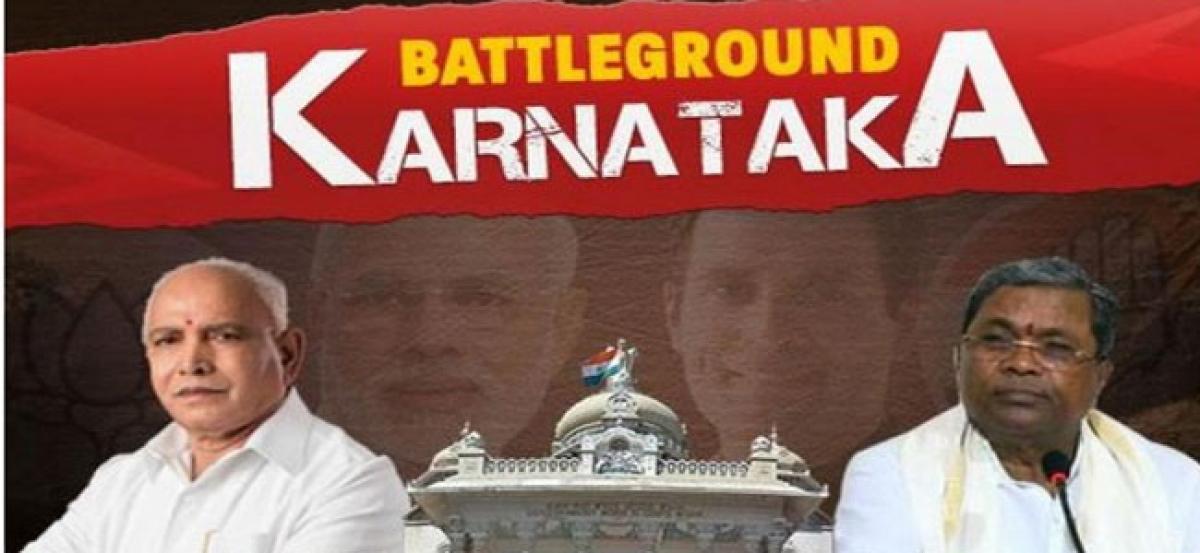Live
- Pushpa 2 Hits ₹1000 Crore in 6 Days: How It Compares to Other Top Indian Films
- Vivo X200 and X200 Pro Launched in India: Price, Specifications, and Features
- Nitin Gadkari Admits Feeling Embarrassed at Global Summits Over Rising Road Accidents in India
- Opposition Slams ‘One Nation, One Election’ Bill as Anti-Democratic; BJP Allies Support the Move
- Celebrate Karthigai Maha Deepam Virtually with Sri Mandir’s LIVE Darshan Experience
- BJP Extends Support to Samagra Shiksha Abhiyan Employees' Strike, Demands Immediate Regularization and Welfare Benefits
- Dr. M. Priyanka Stresses Quality Education, Nutritious Meals, and Cleanliness in Schools
- Mandal Level CM Cup Sports Concludes in Ija with Promising Talent and Enthusiastic Participation
- Harish Rao Slams Revanth Reddy: "More Talk, Less Action"
- Revolutionising Oil and Gas: Gaurav Kumar Sinha’s AI-Driven Innovations Transforming Efficiency and Profitability
Just In

The crucial May 12 Karnataka assembly election is being looked at as a game changer for the Congress across the country and as a gateway for the Bharatiya Janata Party (BJP) into the south.
New Delhi : The crucial May 12 Karnataka assembly election is being looked at as a game changer for the Congress across the country and as a gateway for the Bharatiya Janata Party (BJP) into the south.
Right from the start of campaigning, if there is one thing that has stood out and remained constant, it is the religious undertone at most of the BJP and Congress rallies.
For long, the saffron party has been accused by the Opposition of promoting a religion-centric campaign, relying on Karnataka's majority Hindu population, which stands close to 84 percent.
Uttar Pradesh Chief Minister Yogi Adityanath recently said that by voting for the BJP, the people of Karnataka will lay the foundation stone of what he called as "Ram Rajya" in the state.
"Uttar Pradesh is the land of Lord Ram and Karnataka is the home to Lord Hanuman. By voting for the BJP, you are actually voting for Lord Rama and Lord Hanuman," he said while campaigning for the party in the state in the week gone by.
The Siddaramaiah-led government in Karnataka, which had accused the BJP of being communal, however, has not been able to stay away from stepping into the murky waters of identity politics.
Just ahead of Saturday's election, Siddramaiah has accepted a proposal to recognise Lingayat as a different religion. Though caste has rarely had an impact on elections in Karnataka, the Lingayats do have a history of being a BJP vote bank that influences outcomes in a majority of the state's 224 assembly constituencies.
Siddaramaiah has been eyeing the Lingayat vote bank ever since he accepted the recommendation of the Nagamohan Das Committee to give a separate religious status to the Lingayats. This move of the Karnataka Chief Minister is aimed at making it tough for the BJP by snatching away an influential and traditional vote bank.
While the Congress has relied on its time-tested AHINDA formula, which stands for Alpasankhyataru (Minorities), Hindulidavaru (Backward Classes) and Dalitaru (Dalits), calling themselves a party for all, its temple-running and visiting spree is a proof that it is not that far off from what they accuse the BJP of - wooing the majority (Hindu) population.
In fact, Congress spokesperson Randeep Surjewala went to a great extent to prove the Hindu credentials of party chief Rahul Gandhi. He described Rahul not only as a Hindu, but a Janeudhari Hindu -- one who wears the Brahminical thread.
Siddaramaiah, who has always claimed that he would never follow the BJP's brand of communal politics, cannot risk not wooing the majority Hindu voters in the state, and said there is a "Ram" in his name and the BJP should stop calling him anti-Hindu.
For the BJP, it was easy to target Congress and call it out on appeasement and corner the Hindu voter base of the party. The Congress' celebration of 'Tipu Jayanti' has always been pointed out by the BJP as anti-national.
Yogi Adityanath had recently said that Siddaramaiah had objected to a statue of Chhatrapati Shivaji Maharaj coming up in Karnataka, but had no problem in celebrating Tipu Jayanti. "By celebrating Tipu Jayanti, Siddaramaiah is insulting the minorities and the poor of the country," the Uttar Pradesh chief minister said.
In line with the battle over identity, electioneering also targeted food habits. Yogi Adityanath challenged Siddaramaiah to ban the sale of beef in his state if he his Hindu, to which, Siddaramaiah retorted that the BJP cannot question anybody's food choice. One of the first changes Siddaramaiah introduced after coming to power was to overturn the beef ban in the state.
In fact, last year when the Centre issued a notification - Prevention of Cruelty to Animals (Regulation of Livestock Markets) Rules-2017'- which banned the scope for cattle slaughter, the Siddaramaiah Government resisted it by stating that it is a state subject, and therefore, not binding on Karnataka. He even called the move unconstitutional.
Apart from the Hindu and minority votes, there is one another faction that both parties are eyeing, the Vokkaliga, the traditional vote bank of the Janata Dal-Secular (JD-S). The Vokkaligas have the extra push that can give a party an edge over the rest.
Even as campaigning for the May 12 polls ends today, Rashtriya Hindu Sena chief Pramod Muthalik has filed a petition in the Supreme Court claiming that the Congress manifesto for Karnataka is aimed at luring Muslims and other minorities through targeted schemes.
The BJP thus far has reaped the benefit of identity politics in places like Uttar Pradesh, but historically, the run-up to elections in Karnataka don't ever reveal much or enough to signal an assurance of political victory post campaigns charged with religious undertones.
However, if there is one major weapon that all parties risk not using, it is the weapon of identity politics.

© 2024 Hyderabad Media House Limited/The Hans India. All rights reserved. Powered by hocalwire.com







